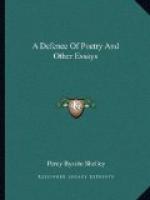The existence of pain has been shown to be a circumstance which the human mind regards with dissatisfaction, and of which it desires the cessation. It is equally according to its nature to desire that the advantages to be enjoyed by a limited number of persons should be enjoyed equally by all. This proposition is supported by the evidence of indisputable facts. Tell some ungarbled tale of a number of persons being made the victims of the enjoyments of one, and he who would appeal in favour of any system which might produce such an evil to the primary emotions of our nature, would have nothing to reply. Let two persons, equally strangers, make application for some benefit in the possession of a third to bestow, and to which he feels that they have an equal claim. They are both sensitive beings; pleasure and pain affect them alike.
CHAPTER II
It is foreign to the general scope of this little treatise to encumber a simple argument by controverting any of the trite objections of habit or fanaticism. But there are two; the first, the basis of all political mistake, and the second, the prolific cause and effect of religious error, which it seems useful to refute.
First, it is inquired, ’Wherefore should a man be benevolent and just?’ The answer has been given in the preceding chapter.
If a man persists to inquire why he ought to promote the happiness of mankind, he demands a mathematical or metaphysical reason for a moral action. The absurdity of this scepticism is more apparent, but not less real than the exacting a moral reason for a mathematical or metaphysical fact. If any person should refuse to admit that all the radii of a circle are of equal length, or that human actions are necessarily determined by motives, until it could be proved that these radii and these actions uniformly tended to the production of the greatest general good, who would not wonder at the unreasonable and capricious association of his ideas?
The writer of a philosophical treatise may, I imagine, at this advanced era of human intellect, be held excused from entering into a controversy with those reasoners, if such there are, who would claim an exemption from its decrees in favour of any one among those diversified systems of obscure opinion respecting morals, which, under the name of religions, have in various ages and countries prevailed among mankind. Besides that if, as these reasoners have pretended, eternal torture or happiness will ensue as the consequence of certain actions, we should be no nearer the possession of a standard to determine what actions were right and wrong, even if this pretended revelation, which is by no means the case, had furnished us with a complete catalogue of them. The character of actions as virtuous or vicious would by no means be determined alone by the personal advantage or disadvantage of each moral agent individually considered. Indeed, an action




